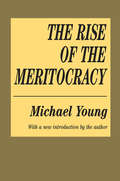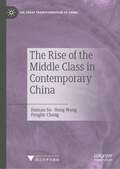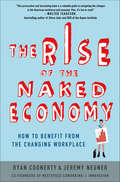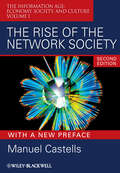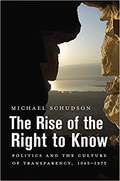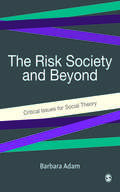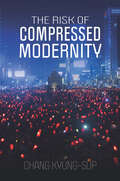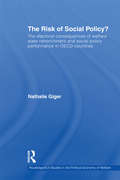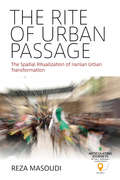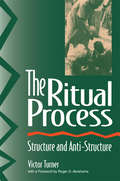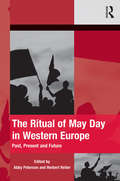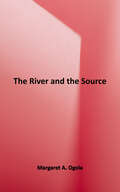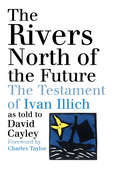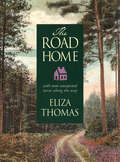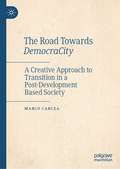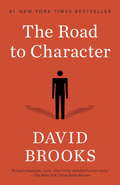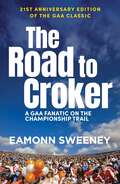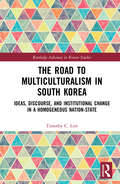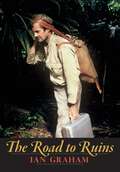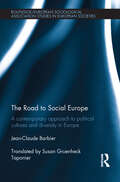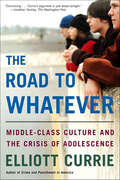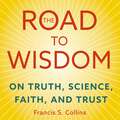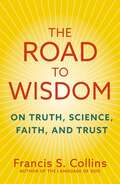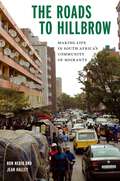- Table View
- List View
The Rise of the Meritocracy (Pelican Ser.)
by Michael YoungMichael Young has christened the oligarchy of the future Meritocracy. Indeed, the word is now part of the English language. It would appear that the formula: IQ+Effort=Merit may well constitute the basic belief of the ruling class in the twenty-first century. Projecting himself into the year 2034, the author of this sociological satire shows how present decisions and practices may remold our society.It is widespread knowledge that it is insufficient to be somebody's nephew to obtain a responsible post in business, government, teaching, or science. Experts in education and selection apply scientific principles to sift out the leaders of tomorrow. You need intelligence rating, qualification, experience, application, and a certain caliber to achieve status. In a word, one must show merit to advance in the new society of tomorrow.In a new opening essay, Young reflects on the reception of his work, and its production, in a candid and lively way. Many of the critical ambiguities surrounding its original publication are now clarified and resolved. What we have is what the Guardian of London called A brilliant essay. and what Time and Tide described as a fountain gush of new ideas. Its wit and style make it compulsively enjoyable reading from cover to cover.
The Rise of the Middle Class in Contemporary China (The Great Transformation of China)
by Hong Wang Hainan Su Fenglin ChangThis book portrays the middle class in contemporary China with plain language and precise professional knowledge in an all-round, broad and responsible way from the perspectives of income, property, profession, education, consumption, investment, physiological and behavioral characteristics, history and development. It gives, in a logical order, the reasons for stimulating the rise of the middle class in contemporary China. It emphatically describes what the middle class is and what the middle class in contemporary China looks like. It also analyzes whether the middle class can rise in China and sheds light on the basic thinking, medium and long-term goals, main measures and current work priorities for achieving full rise of the middle class in contemporary China. As China becomes the world's largest economy, the new middle class will be the Chinese people facing the world; as such, this book will be of interest to sociologists, sinologists, political scientists, and economists.
The Rise of the Naked Economy: How to Benefit from the Changing Workplace
by Ryan Coonerty Jeremy NeunerWhat happens when work is no longer a place but a state of mind: when the trappings that have defined the economy as we knew it are stripped away and we start from the bare essence of what it means to make a living? From corner coffee shops to Fortune 500 companies, workers from all different backgrounds are creating a new reality and prosperity. The Rise of the Naked Economy shows readers how to achieve both personal and professional success in an economy that does not guarantee lifetime employment. Pioneers Coonerty and Neuner report from the front lines on the future of work. From the recently graduated to the recently laid off, this book covers how the rise in non-traditional employment calls for a new infrastructure, strategy, and attitude for workers, companies, and communities alike. Through interviews with the people, companies, and policymakers who are leading the change and already profiting from it, The Rise of the Naked Economy provides an optimistic, humorous, and inspirational vision for readers who want reclaim their lives and livelihoods.
The Rise of the Network Society: The Information Age: Economy, Society And Culture, Volume I (Information Age Series #12)
by Manuel CastellsThis first book in Castells' groundbreaking trilogy, with a substantial new preface, highlights the economic and social dynamics of the information age and shows how the network society has now fully risen on a global scale. Groundbreaking volume on the impact of the age of information on all aspects of society Includes coverage of the influence of the internet and the net-economy Describes the accelerating pace of innovation and social transformation Based on research in the USA, Asia, Latin America, and Europe
The Rise of the Right to Know: Politics and the Culture of Transparency, 1945-1975
by Michael SchudsonModern transparency dates to the 1950s, 1960s, and 1970s--well before the Internet. Michael Schudson shows how the "right to know" has defined a new era for democracy--less focus on parties and elections, more pluralism and more players, year-round monitoring of government, and a blurring line between politics and society, public and private.
The Risk Society and Beyond: Critical Issues for Social Theory
by Ulrich Beck Barbara Adam Joost Van LoonUlrich Beck's best selling Risk Society established risk on the sociological agenda. It brought together a wide range of issues centering on environmental, health and personal risk, provided a rallying ground for researchers and activists in a variety of social movements and acted as a reference point for state and local policies in risk management. The Risk Society and Beyond charts the progress of Beck's ideas and traces their evolution. It demonstrates why the issues raised by Beck reverberate widely throughout social theory and covers the new risks that Beck did not foresee, associated with the emergence of new technologies, genetic and cybernetic. The book is unique because it offers both an introduction to the main arguments in Risk Society and develops a range of critical discussions of aspects of this and other works of Beck.
The Risk of Compressed Modernity
by Chang Kyung-SupIn many Asian societies, the process of modernization often took place in a rapid and highly compressed fashion – not over centuries, as had happened in most Western societies, but in several decades. This enabled Asian societies to achieve high levels of economic growth very quickly, but it also harbored unexpected risks and costs that threatened further development. The very mechanisms and strategies that made their explosive modernization possible tended to produce existentially hazardous consequences in virtually all areas of public and private life, and seemingly insurmountable obstacles to sustained advances in the future. Focusing on South Korea and other Asian countries, this book presents a critical account of compressed modernity and its key structural risks. These include endemic political crises, distorted industrial governance, widespread labor displacement, worsening intellectual and cultural dependency, rampant environmental and physical hazards, and even abrupt demographic meltdown. However, these risks and contradictions have also stimulated structural reforms and adaptations, opening up the possibility for the kind of radical change that Ulrich Beck described as “the metamorphosis of the world.”
The Risk of Social Policy?: The electoral consequences of welfare state retrenchment and social policy performance in OECD countries (Routledge Studies in the Political Economy of the Welfare State)
by Nathalie GigerThe Risk of Social Policy? uses a comparative perspective to systematically analyse the effects of social policy reforms and welfare state retrenchment on voting choice for the government. It re-examines twenty elections in OECD countries to show if and how social policy issues drive elections. This book contributes to the existing literature by providing an empirical analysis of the electoral implications of social policy. Giger asks the basic research question: What are the electoral consequences of social policy performance and retrenchment? More specifically, the following questions are addressed in order to provide a systematic test of the topic: Is retrenchment indeed completely unpopular? Do people punish the government for bad performance in the field of social policy? And what are the political implications of such a punishment reaction; does it affect the government composition? It shows empirically that the risks of welfare state retrenchment to incumbent governments may be lower than previously thought, and presents a theoretical framework for re-examining the impact of retrenchment initiatives on election outcome. Making an important contribution to studies in political economy and welfare by questioning the assumption that social policy is an inherently controversial policy field in times of elections, The Risk of Social Policy? will be of interest to scholars and students concerned with the interplay between government and citizens, social policy and voting behaviour, and the political economy of welfare.
The Rite of Urban Passage: The Spatial Ritualization of Iranian Urban Transformation (Articulating Journeys: Festivals, Memorials, and Homecomings #2)
by Reza MasoudiThe Iranian city experienced a major transformation when the Pahlavi Dynasty initiated a project of modernization in the 1920s. The Rite of Urban Passage investigates this process by focusing on the spatial dynamics of Muharram processions, a ritual that commemorates the tragic massacre of Hussein and his companions in 680 CE. In doing so, this volume offers not only an alternative approach to understanding the process of urban transformation, but also a spatial genealogy of Muharram rituals that provides a platform for developing a fresh spatial approach to ritual studies.
The Ritual Process: Structure and Anti-Structure (Symbol, Myth And Ritual Ser.)
by Victor Turner Alfred Harris Roger D AbrahamsIn The Ritual Process: Structure and Anti-Structure, Victor Turner examines rituals of the Ndembu in Zambia and develops his now-famous concept of "Communitas." He characterizes it as an absolute inter-human relation beyond any form of structure. The Ritual Process has acquired the status of a small classic since these lectures were first published in 1969. Turner demonstrates how the analysis of ritual behavior and symbolism may be used as a key to understanding social structure and processes. He extends Van Gennep's notion of the "liminal phase" of rites of passage to a more general level, and applies it to gain understanding of a wide range of social phenomena. Once thought to be the "vestigial" organs of social conservatism, rituals are now seen as arenas in which social change may emerge and be absorbed into social practice. As Roger Abrahams writes in his foreword to the revised edition: "Turner argued from specific field data. His special eloquence resided in his ability to lay open a sub-Saharan African system of belief and practice in terms that took the reader beyond the exotic features of the group among whom he carried out his fieldwork, translating his experience into the terms of contemporary Western perceptions. Reflecting Turner's range of intellectual interests, the book emerged as exceptional and eccentric in many ways: yet it achieved its place within the intellectual world because it so successfully synthesized continental theory with the practices of ethnographic reports."
The Ritual of May Day in Western Europe: Past, Present and Future (The Mobilization Series on Social Movements, Protest, and Culture)
by Herbert Reiter Abby PetersonEric Hobsbawm claimed that the international May Day, which dates back to a proclamation in 1889 by the Second International, 'is perhaps the most ambitious of labour rituals'. The first international May Day demonstrations in 1890 were widely celebrated across Europe and became the one day each year when organized labour could present its goals to the public, an eight-hour workday being the first concrete demand, shortly followed by those for improved working conditions, universal suffrage, peace among nations, and international solidarity. The May Day ritual celebration was the self-assertion and self-definition of the new labour class through class organization. Thus, it was trade unions and social democratic and socialist parties throughout Europe which took the initiative and have sustained May Day as a labour ritual to this day. Part I of this theoretically-informed volume explores how May Day demonstrations have evolved and taken different trajectories in different political contexts. Part II focuses on May Day rituals today. By comparing demonstration level data of over 2000 questionnaires from six countries, including Belgium, Italy, Spain, Sweden, Switzerland and the UK, the reader is able to gain a thorough understanding of how participants are bestowing meaning on May Day rituals. By concluding with reflections on the future of the May Day ritual in Western Europe, this ground-breaking book provides a detailed analysis of its evolution as a protest event.
The River and the Source
by Margaret A OgolaIn 1995, this novel won both the Jomo Kenyatta Literature Prize and the Commonwealth Writers' Prize for Best First Book in the Africa Region. Now reprinted, it remains in great demand. An epic story spanning cultures, it tells the lives of three generations of women. It traces the story of Akoko in her rich traditional Luo setting, through to the children who live and die in the 20th century.
The Rivers North of the Future: The Testament Of Ivan Illich
by David CayleyIn The Rivers North of the Future David Cayley has compiled Ivan Illich's moving and insightful thoughts concerning the fate of the Christian Gospel. Illich's view, which could be summed up as the corruption of the best is the worst, is that Jesus' call to love more abundantly became the basis for new forms of power in the hands of those who organized and administered this New Testament. Illich also explores the invention of technology, the road from hospitality to the hospital, the criminalization of sin, the church as the template of the modern state, and the death of nature. Illich's analysis of contemporary society as a congealed and corrupted Christianity is both a bold historical hypothesis and a call to believers to re-invent the Christian church. With a foreword by Charles Taylor. Ivan Illich (1926-2002) was a brilliant polymath, an iconoclastic thinker, and a prolific writer. He was a priest, vice-rector of a university, founder of the Centre for Intercultural Documentation in Cuernavaca, Mexico, and author of numerous books, including Deschooling Society, Tools for Conviviality, Energy and Equity, and Medical Nemesis.
The Road Home
by Eliza ThomasIt occurred to Eliza Thomas when she hit her forties that home might be "someplace you made." A modest cabin in the woods of Vermont seemed like a good place to start. Thomas's funny, heartwarming experiences transform the weekend cabin into a real home--a place where Thomas paints the floor the same color as her grandmother's beach house porch; where hordes of ladybugs come to visit one Indian summer; and the place her adopted baby daughter excitedly recognizes as they make their way through the woods in a snowstorm. In writing that is at once funny and poignant, Eliza Thomas welcomes us into the warm and cozy rooms of her first real home. "A charming memoir . . . Thomas details the joys and problems of rural living."--Publishers Weekly; "Pleasant to read, funny at times, candid and poignant at others . . . by the end of the book, Thomas accomplishes a remodeled future built by hand, and a sense of her life as a narrative leading home."--The New York Times Book Review; "Another back-to-nature/independent woman story? Hardly. Which is what makes Thomas's memoir, THE ROAD HOME, all the more enjoyable. . . . She conveys a very real, living definition of home."--The Boston Globe. A BOOK-OF-THE-MONTH CLUB and QUALITY PAPERBACK BOOK CLUB selection.
The Road Towards DemocraCity: A Creative Approach to Transition in a Post-Development Based Society
by Marco CarceaThis book discusses the challenges faced by the homo resaliens and his need for a transition to a more sustainable social, economic, and environmental system. It fills a gap in the existing literature and provides a new perspective by changing the etymology of the word resilience: no more resiliere, but resalio. By comparing and analysing the relevant literature, the author has coined the term homo resaliens (resilient man), in contrast to the failure of the homo oeconomicus, the corruption of the homo politicus, the incompleteness of homo sustinens, and the limits of homo ecologicus. Opening a new debate in which the role of academia and res publica are fundamental to safeguard human communities and future generations, this book will greatly assist governments that wish to understand the socio-political and economic implication of resilience in terms of social inclusiveness and long term social and environmental sustainability.
The Road to Character
by David Brooks"I wrote this book not sure I could follow the road to character, but I wanted at least to know what the road looks like and how other people have trodden it."--David Brooks<P><P> With the wisdom, humor, curiosity, and sharp insights that have brought millions of readers to his New York Times column and his previous bestsellers, David Brooks has consistently illuminated our daily lives in surprising and original ways. In The Social Animal, he explored the neuroscience of human connection and how we can flourish together. Now, in The Road to Character, he focuses on the deeper values that should inform our lives. Responding to what he calls the culture of the Big Me, which emphasizes external success, Brooks challenges us, and himself, to rebalance the scales between our "résumé virtues"--achieving wealth, fame, and status--and our "eulogy virtues," those that exist at the core of our being: kindness, bravery, honesty, or faithfulness, focusing on what kind of relationships we have formed.<P> Looking to some of the world's greatest thinkers and inspiring leaders, Brooks explores how, through internal struggle and a sense of their own limitations, they have built a strong inner character. Labor activist Frances Perkins understood the need to suppress parts of herself so that she could be an instrument in a larger cause. Dwight Eisenhower organized his life not around impulsive self-expression but considered self-restraint. Dorothy Day, a devout Catholic convert and champion of the poor, learned as a young woman the vocabulary of simplicity and surrender. Civil rights pioneers A. Philip Randolph and Bayard Rustin learned reticence and the logic of self-discipline, the need to distrust oneself even while waging a noble crusade.<P> Blending psychology, politics, spirituality, and confessional, The Road to Character provides an opportunity for us to rethink our priorities, and strive to build rich inner lives marked by humility and moral depth.<P> "Joy," David Brooks writes, "is a byproduct experienced by people who are aiming for something else. But it comes."
The Road to Croker
by Eamonn SweeneyThe 21st anniversary edition of the GAA classic, with a new author Foreword.In 2003, sportswriter and GAA fanatic Eamonn Sweeney set out to uncover why each year, from May to September, the Irish nation is seized in the grip of GAA frenzy. The result was a best-seller sports memoir, first published in 2004.In this hilarious and riveting account, Sweeney transports us to the raw excitement of the terraces, the clubhouses and the bars, recalling the highs and lows of a remarkable season. Via Kerry, Down, Tyrone, Tipperary, Cork, Dublin and beyond, he revealed how it was that, from working-class estates to Gaeltacht communities, from republican strongholds to the Dublin cross-dressing scene, the GAA cast the same spell across Ireland. Find out which midlands town was the Irish capital of arm wrestling, what it was like to play for the weakest team in the country, and why you should never ring a Laois man the day after he's won the Leinster title. Told with immediacy and verve, The Road to Croker was the first book to unravel the mysteries of a national obsession. Including anecdotes and interviews with players, managers and fans, this is the companion volume to the author's acclaimed 2025 book The Last Ditch.
The Road to Croker
by Eamonn SweeneyThe 21st anniversary edition of the GAA classic, with a new author Foreword.In 2003, sportswriter and GAA fanatic Eamonn Sweeney set out to uncover why each year, from May to September, the Irish nation is seized in the grip of GAA frenzy. The result was a best-seller sports memoir, first published in 2004.In this hilarious and riveting account, Sweeney transports us to the raw excitement of the terraces, the clubhouses and the bars, recalling the highs and lows of a remarkable season. Via Kerry, Down, Tyrone, Tipperary, Cork, Dublin and beyond, he revealed how it was that, from working-class estates to Gaeltacht communities, from republican strongholds to the Dublin cross-dressing scene, the GAA cast the same spell across Ireland. Find out which midlands town was the Irish capital of arm wrestling, what it was like to play for the weakest team in the country, and why you should never ring a Laois man the day after he's won the Leinster title. Told with immediacy and verve, The Road to Croker was the first book to unravel the mysteries of a national obsession. Including anecdotes and interviews with players, managers and fans, this is the companion volume to the author's acclaimed 2025 book The Last Ditch.
The Road to Multiculturalism in South Korea: Ideas, Discourse, and Institutional Change in a Homogenous Nation-State (Routledge Advances in Korean Studies)
by Timothy C. LimThis book aims to capture the complicated development of Korea from monoethnic to multicultural society, challenging the narrative of “ethnonational continuity” in Korea through a discursive institutional approach. At a time when immigration is changing the face of South Korea and an increasingly diverse society becomes empirical fact, this doesn’t necessarily mean that multiculturalism has been embraced as a normative, policy-based response to that fact. The approach here diverges from existing academic analyses, which tend to conclude that core institutions defining Korea’s immigration and nationality regimes—nd which, crucially, also reflect a basic and hitherto unyielding commitment to racial and ethnic homogeneity—ill remain largely unaffected by increasing diversity. Here, this title underscores the critical importance of “discursive agency” as a necessary corrective to still dominant power and interestbased arguments. In addition, “discursive agents” are found to play a central role in communicating, promoting, and helping to instill the ideas that create a basis for change on the road to remaking Korean society. The Road to Multiculturalism in South Korea will be of interest to students and scholars of Asian studies, immigration and migration studies, race and ethnic studies, as well as comparative politics broadly.
The Road to Ruins
by Ian GrahamFor anyone who ever wanted to be an archaeologist, Ian Graham could be a hero. This lively memoir chronicles Graham's career as the last explorer and a fierce advocate for the protection and preservation of Maya sites and monuments across Mexico, Guatemala, and Belize. It is also full of adventure and high society, for the self-deprecating Graham traveled to remote lands such as Afghanistan in wonderful company. He tells entertaining stories about his encounters with a host of notables beginning with Rudyard Kipling, a family friend from Graham's childhood.Born in 1923 into an aristocratic family descended from Oliver Cromwell, Ian Graham was educated at Winchester, Cambridge, and Trinity College, Dublin. His career in Mesoamerican archaeology can be said to have begun in 1959 when he turned south in his Rolls Royce and began traveling through the Maya lowlands photographing ruins. He has worked as an artist, cartographer, and photographer, and has mapped and documented inscriptions at hundreds of Maya sites, persevering under rugged field conditions. Graham is best known as the founding director of the Corpus of Maya Hieroglyphic Inscriptions Program at the Peabody Museum of Archaeology and Ethnology, Harvard University. He was awarded a MacArthur Foundation genius grant in 1981, and he remained the Maya Corpus program director until his retirement in 2004.Graham's careful recordings of Maya inscriptions are often credited with making the deciphering of Maya hieroglyphics possible. But it is the romance of his work and the graceful conversational style of his writing that make this autobiography must reading not just for Mayanists but for anyone with a taste for the adventure of archaeology.
The Road to Social Europe: A Contemporary Approach to Political Cultures and Diversity in Europe (Studies in European Sociology)
by Jean-Claude BarbierIn the wake of the Greek and Irish crises, and at a moment when solidarity between states is hotly debated on a daily basis at EU level, it is important to understand how ‘solidarity’ can happen at all. The Road to Social Europe reviews the development of political cultural processes since the nineteenth century, showing how social protection and social justice have gradually become interwoven with systems of social protection, or welfare states. Grounded on extensive empirical research conducted in many EU countries and in the European Commission’s administration over twenty years, the book provides a cultural analysis of welfare systems in Europe. It also presents an original enquiry into the importance of languages for politics in Europe, for the politics of welfare, and for sociological research. It shows how sociological and ethnographic analysis can help in understanding the current and future challenges of European integration that rely unilaterally on functional economics. This in-depth sociological analysis of European diversity will appeal to a wide audience of students and scholars of sociology, political science, political economy and European studies.
The Road to Whatever: Middle-Class Culture and the Crisis of Adolescence
by Elliott CurrieFrom the Pulitzer Prize finalist, a sharp and compassionate investigation of the root causes of the epidemic of drug abuse, violence, and despair among "mainstream" American teenagersIn the past few years, it has become painfully clear that all is not well with the children of middle-class America. Beyond the shootings at Columbine, hardly a day goes by without stories of drug use, binge drinking, fatal accidents, and senseless suicides among middle-class adolescents. But the "why" of these tragedies has eluded us.In this groundbreaking book, acclaimed sociologist and Pulitzer Prize finalist Elliott Currie rejects such predictable answers as TV violence, permissiveness, and inherent evil. Instead, drawing on years of interviews, he links this crisis to a pervasive "culture of exclusion" that has left young people facing an ever more unforgiving world. Currie describes a society in which severe punishment and "zero tolerance" of adolescent misbehavior have become the norm, where "tough love" and medications have replaced engagement and guidance. Broadening his inquiry, he dissects the changes in middle-class life that have enforced newly rigid divides between winners and losers and imposed an extraordinarily harsh culture-and not just on kids.Vivid, compelling, and deeply empathetic, The Road to Whatever is a profound investigation of what has gone wrong for so many American teenagers and a stark indictment of a society that has lost the will-or the capacity-to care.
The Road to Wisdom: On Truth, Science, Faith and Trust
by Francis S. CollinsFrom world-leading scientist and New York Times bestselling author of The Language of God, a deeply thoughtful guidebook to discerning what and who we can trust to move us from societal discord to civic harmony.As the COVID-19 pandemic revealed, western society has become not just hyper-partisan, but also deeply cynical; distrustful of traditional sources of knowledge and wisdom such as science and faith. Scepticism about vaccines led to the needless deaths of at least 230,000 Americans, and "Do your own research" is now a rallying cry in many online rabbit holes. Yes, experts can make mistakes, and institutions can lose their moral compass, but there are reliable ways and means to weigh information and navigate truth, and The Road to Wisdom is here to help us rediscover them.Francis Collins reminds us of the four core sources of judgement and clear thinking: truth, science, faith, and trust. Drawing on his scientific work at the forefront of the Human Genome Project and the US National Institutes of Health, as well as on ethics, philosophy, and theology, Collins makes a robust, thoughtful case for each of these sources - their reliability, and their limits. Ultimately, he shows how they work together, not separately - and certainly not in conflict. It is only when we re-link these four pillars of wisdom that we can begin to discern the best path forward in life.Hopeful, accessible, winsome, and deeply wise, The Road to Wisdom leads us beyond current animosities to surer footing. Here is the moral, philosophical, and scientific framework with which to address the problems of our time - on the world stage, but also in our daily lives.
The Road to Wisdom: On Truth, Science, Faith and Trust
by Francis S. CollinsFrom world-leading scientist and New York Times bestselling author of The Language of God, a deeply thoughtful guidebook to discerning what and who we can trust to move us from societal discord to civic harmony.As the COVID-19 pandemic revealed, western society has become not just hyper-partisan, but also deeply cynical; distrustful of traditional sources of knowledge and wisdom such as science and faith. Scepticism about vaccines led to the needless deaths of at least 230,000 Americans, and "Do your own research" is now a rallying cry in many online rabbit holes. Yes, experts can make mistakes, and institutions can lose their moral compass, but there are reliable ways and means to weigh information and navigate truth, and The Road to Wisdom is here to help us rediscover them.Francis Collins reminds us of the four core sources of judgement and clear thinking: truth, science, faith, and trust. Drawing on his scientific work at the forefront of the Human Genome Project and the US National Institutes of Health, as well as on ethics, philosophy, and theology, Collins makes a robust, thoughtful case for each of these sources - their reliability, and their limits. Ultimately, he shows how they work together, not separately - and certainly not in conflict. It is only when we re-link these four pillars of wisdom that we can begin to discern the best path forward in life.Hopeful, accessible, winsome, and deeply wise, The Road to Wisdom leads us beyond current animosities to surer footing. Here is the moral, philosophical, and scientific framework with which to address the problems of our time - on the world stage, but also in our daily lives.
The Roads to Hillbrow: Making Life in South Africa's Community of Migrants (Polis: Fordham Series in Urban Studies)
by Jean Halley Ron NerioThis highly accessible portrayal of a post-apartheid neighborhood in transition analyzes the relationship between identity, migration, and place.Since it was founded in 1894, amidst Johannesburg’s transformation from a mining town into the largest city in southern Africa, Hillbrow has been a community of migrants. As the “city of gold” accumulated wealth on the backs of migrant laborers from southern Africa, Jewish Eastern Europeans who had fled pogroms joined other Europeans and white South Africans in this emerging suburb. After World War II, Hillbrow became a landscape of high-rises that lured western and southern Europeans seeking prosperity in South Africa’s booming economy. By the 1980s, Hillbrow housed some of the most vibrant and visible queer spaces on the continent while also attracting thousands of Indian and Black South Africans who defied apartheid laws to live near the city center. Filling the void for a book about migration within the Global South, The Roads to Hillbrow explores how one South African neighborhood transformed from a white suburb under apartheid into a “grey zone” during the 1970s and 1980s to become a “port of entry” for people from at least twenty-five African countries. The Roads to Hillbrow explores the diverse experiences of domestic and transnational migrants who have made their way to this South African community following war, economic dislocation, and the social trauma of apartheid. Authors Ron Nerio and Jean Halley weave sociology, history, memoir, and queer studies with stories drawn from more than 100 interviews. Topics cover the search for employment, options for housing, support for unaccompanied minors, possibilities for queer expression, the creation of safe parks for children, and the challenges of living without documents. Current residents of Hillbrow also discuss how they cope with inequality, xenophobia, high levels of crime, and the harsh economic impacts of COVID-19.Many of the book’s interviewees arrived in Hillbrow seeking not only to gain better futures for themselves but also to support family members in rural parts of South Africa or in their countries of origin. Some immerse themselves in justice work, while others develop LGBTQ+ support networks, join religious and community groups, or engage in artistic expression. By emphasizing the disparate voices of migrants and people who work with migrants, this book shows how the people of Hillbrow form connections and adapt to adversity.
